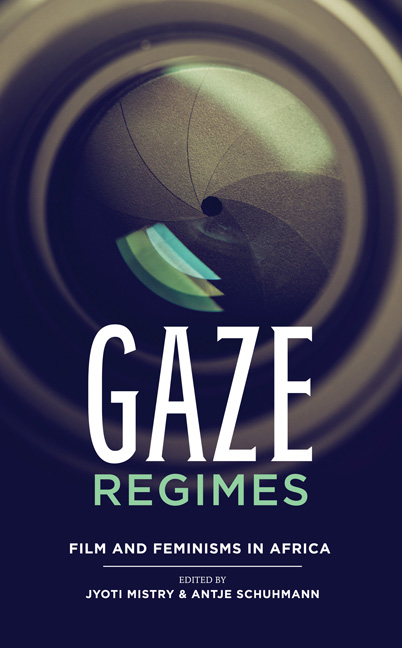Book contents
- Frontmatter
- Contents
- Acknowledgements
- Foreword: Goethe-Institut sub-Saharan Africa
- Introduction: By way of context and content
- 1 African Women in Cinema: An overview
- 2 ‘I am a feminist only in secret’
- 3 Staged Authenticity: Femininity in photography and film
- 4 ‘Power is in your own hands’: Why Jihan El-Tahri does not like movements
- 5 Aftermath – A focus on collective trauma
- 6 Shooting Violence and Trauma: Traversing visual and social topographies in Zanele Muholi's work
- 7 Puk Nini – A Filmic Instruction in Seduction: Exploring class and sexuality in gender relations
- 8 I am Saartjie Baartman
- 9 Filmmaking at the Margins of a Community: On co-producing Elelwani
- 10 On Collective Practice and Collected Reflections
- 11 ‘Cinema of resistance’
- 12 Dark and Personal
- 13 ‘Change? This might mean to shove a few men out’
- 14 Barakat! means Enough!
- 15 ‘Women, use the gaze to change reality’
- 16 Post-colonial Film Collaboration and Festival Politics
- 17 Tsitsi Dangarembga: A manifesto
- Acronyms and Abbreviations
- List of Contributors
- Filmography
- Index
14 - Barakat! means Enough!
Published online by Cambridge University Press: 20 April 2018
- Frontmatter
- Contents
- Acknowledgements
- Foreword: Goethe-Institut sub-Saharan Africa
- Introduction: By way of context and content
- 1 African Women in Cinema: An overview
- 2 ‘I am a feminist only in secret’
- 3 Staged Authenticity: Femininity in photography and film
- 4 ‘Power is in your own hands’: Why Jihan El-Tahri does not like movements
- 5 Aftermath – A focus on collective trauma
- 6 Shooting Violence and Trauma: Traversing visual and social topographies in Zanele Muholi's work
- 7 Puk Nini – A Filmic Instruction in Seduction: Exploring class and sexuality in gender relations
- 8 I am Saartjie Baartman
- 9 Filmmaking at the Margins of a Community: On co-producing Elelwani
- 10 On Collective Practice and Collected Reflections
- 11 ‘Cinema of resistance’
- 12 Dark and Personal
- 13 ‘Change? This might mean to shove a few men out’
- 14 Barakat! means Enough!
- 15 ‘Women, use the gaze to change reality’
- 16 Post-colonial Film Collaboration and Festival Politics
- 17 Tsitsi Dangarembga: A manifesto
- Acronyms and Abbreviations
- List of Contributors
- Filmography
- Index
Summary
In her debut feature Barakat!, (2006) Algerian filmmaker, Djamila Sahraoui portrays two women who, out of desperation, fear, or simply because ‘they are done’ with being oppressed and victimised, take control of their own destinies. In the early 2000s, Sahraoui became part of a cohort of North African women filmmakers who made films that suggested new ways of seeing – and being – women: Yamina Bachir's Rachida (Algeria, 2002), Nadia El Fani's Bedwin Hacker (Tunisia, 2003) and Yasmine Kassari's The Sleeping Child (Morocco, 2004). These women filmmakers of the Maghreb developed original and pioneering filmic techniques to address oppression and victimisation of women in society.
Sahraoui's film warrants close analysis since it offers a nuanced insider's perspective on the experiences of Muslim women in Algeria living through political revolution and social change. The narrative and characters provide a layered representation of how women strategically navigate the expectations of when to veil and when to choose to be unveiled. Moreover, the narrative point of view from two different generations of women provides a political foil that enables the director to offer a commentary on the contemporary experiences of women in Algeria. In the cohort of films produced by North African women filmmakers Barakat! presents an unflinching point-of view of the multiple layers of women's subjectivities.
Algeria gained independence in 1962 after a liberation war that lasted nearly ten years. The war, which contributed to the brutalisation of the country for decades, was referred to as ‘the Algerian events’ by France (the former coloniser) for the official reason that the Algerian nation did not formally exist at the time.
When anti-government demonstrations broke out in 1988, the Algerian government, led by the National Liberation Front (FNL) first responded violently, before agreeing to political reform. This, in turn, led to the formation of the Islamic Salvation Front (FIS). This Islamist party was doing exceptionally well in the first round of Algeria's 1991 election until the military, out of fear that FIS would be voted into power, annulled the ongoing elections. Soon after, a state of emergency, which lasted until 2011, was declared.
- Type
- Chapter
- Information
- Gaze RegimesFilm and feminisms in Africa, pp. 174 - 181Publisher: Wits University PressPrint publication year: 2015



